 The Chemistry and Biochemistry department is pleased to introduce the recipients of our 2021 undergraduate scholarships!
The Chemistry and Biochemistry department is pleased to introduce the recipients of our 2021 undergraduate scholarships!
This years’ recipients are Sarah Beaudoin, Anabel Chang, Phyllis Liao, Laura Leibfried, Jiayi Yin and Sonny Kusaka. We asked them to tell us a little bit about themselves and their science.
The Faith Van Nice Scholarship is dedicated to the legacy of alumna Faith Van Nice, and recognizes exceptional UO undergraduate students majoring in Chemistry or Biochemistry.
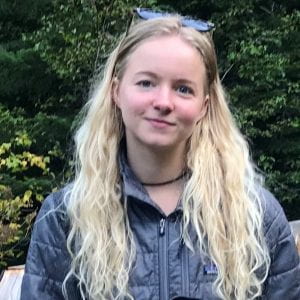
Faith Van Nice Scholarship Recipient
Sarah Beaudoin
I am an incoming Junior at the University of Oregon. Before attending the UO, I grew up in rural Northeastern Oregon and spent time in Nova Scotia, Canada! Currently, I am majoring in Chemistry and plan to declare a minor in Biology as well, with the goal of contributing to renewable energy materials design. Personal motivation for this goal comes from the resilience of the natural world around us, and our need to protect our world for this generation and future generations alike.
My research: The summer after my freshman year, I reached out to Professor Shannon Boettcher, the primary investigator of the Boettcher lab, to apply as an undergraduate researcher. I was originally exposed to the lab during a research immersion course my freshman year and became interested in their focus on electrolysis technology development. Electrolysis, also known as water splitting, consists of two half-reactions occurring within an electrolytic cell, that make possible the extraction of storable and non-pollutive hydrogen gas from water. Conventional industrial-scale electrolyzers use a proton-exchange membrane (PEM) electrolysis cell, wherein the local conditions are very proton-rich and therefore acidic. However, these cells are incredibly sensitive to contaminants in the electrolyte and require stable precious metal catalysts due to the corrosive acidic conditions. Anion-exchange membrane (AEM) electrolysis, which utilizes locally basic conditions, is currently being studied by the Boettcher Lab because of its increased resistance to trace contaminants and potential use of non-precious group metal (PGM) catalysts.
Currently, I am working under the supervision of Grace Lindquist (PhD candidate) and Shannon Boettcher to explore the use of non-PGM catalysts in an AEM electrolysis system. Development of cost effective and efficient AEM electrolyzers will be crucial to the large-scale implementation of hydrogen fuel, helping mitigate climate change and reduce the need for harmful fossil fuels.
What’s next? Upon finishing my undergraduate degree, I plan to attend graduate school for further chemistry or engineering education and continue researching hydrogen fuel production, or possibly other modes of renewable energy advancement. Eventually, I hope to join the scientific research industry, where I can use my acquired skill to solve some of the most urgent issues facing human wellbeing.
The Kuntz-Swinehart Memorial Scholarship recognizes academic excellence in our majors, and was established by former UO Chemistry students in honor of two professors whose instruction, influence and inspiration had a significant impact on their career paths.
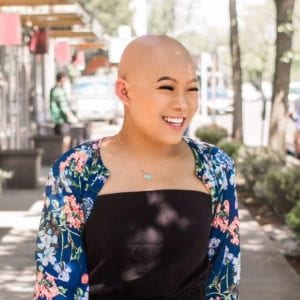
Kuntz-Swinehart Scholarship Recipient
Anabel Chang
I am entering my senior year at UO with a biochemistry major and business administration minor. My hometown is Corvallis, OR and my family is from Taipei, Taiwan! I first became curious about science in middle school when I developed alopecia, an autoimmune disease which causes hair loss, and I sought to understand the disease. Now as I am learning more about science at UO, I find even mundane things around me fascinating as I try to connect them to the science I’ve learned.
My research: I have been in the Marcus lab since freshman year, where I’m involved in a project aiming to characterize conformational fluctuations of DNA fork junctions! We use very cool and fancy lasers to track the dynamics and structure of DNA. I have learned so much through my research experience, and I am extremely grateful to have the guidance of mentors in the lab.
What’s next? I am passionate about autoimmune diseases, so I plan to apply to medical school after I gain some more medical experience! I hope to become a dermatologist or rheumatologist.
Final thoughts: It’s an honor to receive this award, and I am blessed to have professors at UO as inspirational as Professor Swinehart and Professor Kuntz which this scholarship honors.
Established in 2020 by a generous donation, the Percy Julian Scholarship seeks to support talented undergraduate scientists in their pursuit of a career in chemistry and recognizes their contributions to promoting diversity, equity, and inclusion in STEM and their potential for further academic achievement.
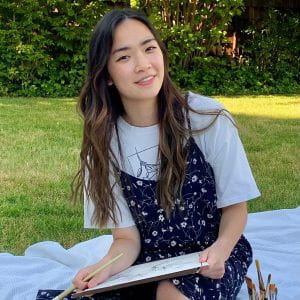
Percy Julian Scholarship Recipient
Phyllis Liao
I am from Beaverton, OR and am an incoming senior at UO. Science intrigues me because it’s a strange juxtaposition between the “pursuit of the unknown” but also being the ultimate form of escapism. I noticed this dissonance as I studied upper-division chemistry courses. I was able to ask probing questions and contest with complacency but also shut out the world while delving into such a niche field of science.
My research: I’ve been working in the Jasti Lab for the past year and a half. My research consists of synthesizing a novel structure called the nanohoop-based rotaxane to react with reactive oxygen species (ROS). Success of the system is indicated by a turn-on fluorescence response when reacted with these ROS and this shows that nanohoop-based [2] rotaxanes are tailorable for use in biomedical research.
What’s next? Through the Jasti Lab, I’ve been interested in continuing with organic synthesis, but I aspire to go to grad school to pursue research in alignment with the environment. I’m interested in working for the EPA and use experience in research to find novel ways to tackle climate change. Additionally, bringing back the idea of dissonance, I want to bridge conversations of diversity/inclusion with science because it’s so easy to completely dissociate from the world in pursuit of science.
Final thoughts: It is an honor to be awarded with the Percy Julian Scholarship as I recognize the significance of Julian as a scientist and my own personal accomplishments.
The Anita and Friedhelm Baitis Scholarship provides funding for undergraduate students to conduct research during the summer in a chemistry or biochemistry laboratory at the University of Oregon, under the mentorship of a Chemistry and Biochemistry department faculty member. Award recipients are chosen from among students that are nominated by department Faculty. This year, the scholarship was awarded to two students.
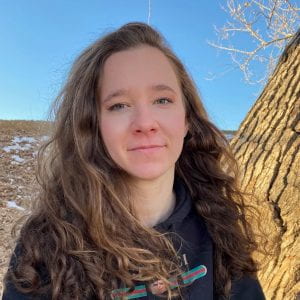
Baitis Scholarship Recipient
Laura Leibfried
I grew up in Boulder, Colorado before moving to Eugene in 2018 to attend the University of Oregon. I am pursuing a double major in physics and chemistry, along with a minor in computer science. Science inspires me not only due to its role in the exploration of the natural world and the quenching of curiosity but more importantly through all the innovation allowed by a greater understanding of physical principles.
My research: I have been doing research since my freshman year where I embarked upon a project working with Dr. Hailin Wang studying the optical modes of micro resonators. I specifically look at microsphere whispering-gallery resonators which have surprisingly high Q-factors and many potential applications including biosensing due to an extremely sensitive evanescent field. During the latter half of my junior year I joined the Wong Group, a primarily optics based physical chemistry lab studying the in situ non-equilibrium excited state dynamics of various materials, all with known applications in solar renewable energy. The project I am involved in is the study of electronic aggregation in squaraine thin films while they are being thermally annealed using transient and linear absorption. Squaraines are a class of molecules showing great promise as donor compounds in organic photo-voltaics, which are easily synthesized and allow for great chemical tunability through R-group substitution.
What’s next? I plan on attending graduate school and plan on pursing a pHD in either physical chemistry or physics with a specialization in optics. Ultimately, I intend to find a career in sustainability linked research.
Final thoughts: I am extremely humbled and grateful to have received this award, as well as all of the numerous opportunities provided to me by the University of Oregon.
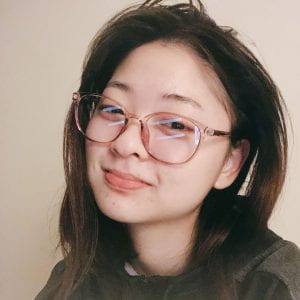
Baitis Scholarship Recipient
JJ Yin
I am a Biochemistry major from China. I will become a senior at the University of Oregon this upcoming Fall. I have enjoyed math and science since I touched base on them in elementary school and got more interested in the next few years. I started out at the University of Oregon unsure of what I wanted to do, but I dived into the general chemistry sequence immediately, thinking that whatever I was going to do in the future would need this, and I was right. So, I stepped onto the track for biochemistry the first day of college without my full awareness. I feel lucky for that and have never regretted it.
My research: I am currently a member of the lovely Harms Lab, that studies relationships between biochemistry and evolution. The Harms Lab is a place full of interesting and positive thoughts, exciting experiments, and awesome scientists.
The immune system activates inflammation in response to both foreign pathogens and internal damage. Dysregulated inflammation can lead to many chronic diseases including cancers. S100A9, a protein expressed in immune cells, strongly activates TLR4, a proinflammatory receptor, and thus activates pathological inflammation. Understanding how S100A9 interacts with TLR4 would be useful to create therapeutics to treat these diseases. My research project is to use evolutionary and biochemical techniques to find out what sequence changes to S100A9 were important in its evolutionary history that led to greater proinflammatory activity. Knowledge of what changes to the protein gave way to this new activity will help us understand how the protein works.
What’s next? I want to attend graduate school and be a PhD student in the Biochemical field, and then become a professor who will keep asking questions that might help the world become a better place.
The P-Chem Undergraduate Fellowship provides funding for undergraduate students to conduct research during the summer in a physical chemistry lab at the University of Oregon, under the mentorship of a physical chemistry faculty member.
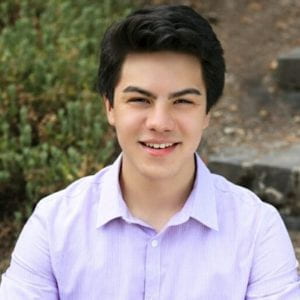
P-Chem Research Fellowship Recipient
Sonny Kusaka
I was born and raised in Portland, Oregon before moving to West Linn, Oregon to attend high school. I will be a senior at UO this upcoming fall. I became interested in medicine at a very young age, and this passion was further nurtured through my science classes in elementary, middle, and high school, with biology and chemistry being two of my favorites. This led me to pursue biochemistry at UO, and I also picked up a Spanish minor after taking Spanish 101 for fun in my freshman year before falling in love with learning the language.
My research: I have been doing research in Professor Marina Guenza’s lab for the past two years. My contributions to the group focus on the SARS-CoV-2 virus responsible for the COVID-19 pandemic. I am analyzing atomistic computer simulations of the SARS-CoV-2 spike protein with FDA-approved inhibitor drugs and comparing that to analysis of simulations without the inhibitor drugs to explore potential treatment options.
What’s next? After my time at UO, I aspire to attend medical school and become a physician. My medical specialty of interest changes all the time the more I learn about all of them, but I love interacting with patients and I could not see myself doing anything else.
Final thoughts: I am honored to have received this fellowship opportunity, and I am very excited to see where my research this summer will take me. I also want to thank Professor Guenza and the rest of the group for their support!
